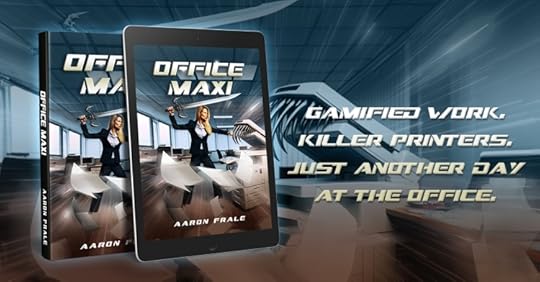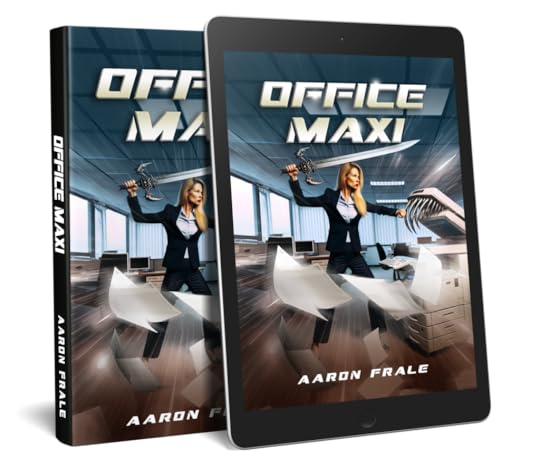Dwarves Charging Over the Hill

I usually have the ending in mind when I start writing a book or series. Once the words came out for writing Office Maxi, the story took shape and had a life of its own. I usually try to get out of the way of my own stories and let them proceed naturally. I’ve seen screenwriters and authors alike attempt to force their will on the story rather than let it progress as it naturally would, given the circumstances the writer has laid down in the beginning, and when a character makes an odd choice for the sake of forwarding the plot, it pulls me out of the story where I’m thinking, “why’d they do that?”
My case in point is the Rings of Power series from Amazon. Overall, I like it, but it’s more just that I like the world, enjoy the characters, and will probably keep watching it, but I don’t love it. It’s not the Peter Jackson Lord of the Ring’s movies which my spouse and I used to watch back-to-back all three extended editions every so often until our son was born (we’ll probably resume this ritual of watching them when he’s old enough).
In fact, I’ll probably just watch the Rings of Power once, to say that I’ve seen it, and will most likely forget most of it twenty years from now. What makes Rings of Power so different than the Lord of the Rings movies to me is the hand of the writer is visible in the storytelling. There are moments where it seems the characters are not doing something because that’s what they’d choose to do, but rather the writer needs them to for the sake of plot.
For example, during the second season, Elrond attempts to convince his dwarf buds to help with the fight against Mordor and in a pivotal moment where he expects the dwarves to charge down the hill and save the day, they don’t come. Those involved with making it are satisfied with the scene because they are breaking expectations of the moment and surprising the audience, as allied armies usually do charge in when all hope is lost.
However, I think the writers were so convinced that the moment had to be there that they didn’t ask if it should. During that moment, the dwarves were dealing with their own civil war and their own king going mad and releasing the Balrog. There was enough on the dwarves’ plate that it would have made more sense for the dwarves to say, “Man, we’d really love to help you, but we got our own shit to deal with.”
To make the choice even more odd, Elrond’s bud, rallies his troops to fight with the elves right after they nearly all die from their own problems (one of which was losing the sun to grow their crops). Now, I know loyalty to a friend is important, but I just couldn’t imagine this beaten down, near starving populace is going to run off and fight for the elves when they got their own shit going on at home.
I mean we can’t even get Americans to agree on whether they support Ukraine or Russia, much less rallying the troops to go fight for them. So, when the dwarves rally anyway to go fight in the battle (a little late to the party but better late than never), it pulled me out of it. The plot driving the characters rather than the characters driving the plot, I think makes the difference between good and great.
I wouldn’t say that I myself am always successful at putting my characters in the driver seat, but I strive to do that with whatever I write. I sometimes have to erase whole chapters or delete entire scenes because I realized that the character wouldn’t make the choice that I think would make a pretty cool scene.
I feel Rings of Power focuses too much on this would look great on camera, or we are going to buck the norm rather than focus on what the character would choose given the set of circumstances. When Elrond went to his bud, he should have gotten a “I’m really sorry, but we can’t do that right now.” It would have blown up the entire sequence when he was waiting for the dwarves to charge down the hill but would have added some tension between him and his friend.
As a writer, you sometimes have to make those choices. The ones where you really want something to happen, but it’s not what the character would do, so you have to let it go. When I was writing Office Maxi, I had even made some choices like that, there were moments where Maxi said and did something she wouldn’t do and I stubbornly kept it in there, because I thought it’d make a cool moment.
I’m happy to say that I’ve eradicated all my dwarves charging over the hill moments. Now, Maxi, and her Office Pool all play the cards they’ve been dealt, and I believe it makes for a better story. I would say that this book is one of my best. It has a little bit of everything, action, adventure, comedy, emotional plotline, and the amount of weird I hope you come to expect from my novels.

Maxi’s first week in a groundbreaking gamified workplace is disrupted by a snarling, drooling printer with large, pointy teeth and a murderous disposition.
After nearly becoming the red toner liquid refill during a killer inkjet’s afternoon snack, Maxi decides to investigate the mysterious company that’s more associated with slimes, zombies, and dragons than office work.
Luckily, she is equipped with an interface that is similar to her favorite RPG-style video games. For once, being a gamer will be good for more than just getting a couple bucks during her live streams.
Maxi normally enjoys LitRPG Urban Fantasy adventures, just not the dying part. Hopefully she can max her levels before the end is nigh and the beasties devour humanity.
Read Office Maxi today!



